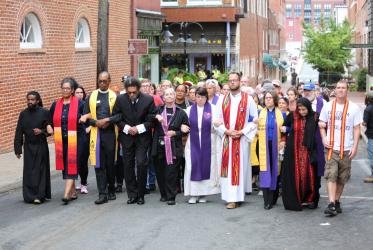Rev. Traci Blackmon, associate general minister of Justice and Local Church Ministries, United Church of Christ, moderated the discussion and offered opening remarks that touched upon how the phrase “Black Lives Matter” has come to resonate globally.
“This phrase resonated so much with people all over the U.S., and eventually globally, that it went from being a sentiment to a mantra to a mission,” she said. “Black Lives Matter now resonates globally as a way of this generation crying out a call that has been with us since enslavement.”
Racism and debt are tied together for many nations that historically have been pilfered of their natural resources, Blackmon noted. “We see this in our environmental issues, in immigration issues, in political issues,” she said.
Speakers then discussed how, after nearly five centuries of colonialism, slavery and the transatlantic slave trade, the same countries that were exploited because of their rich natural and human resources are today tied with enormous pressures imposed by an unfair financial system that clearly advantages the creditors.
Prof Patrick Bond from the University of Johannesburg pointed out that “apartheid, colonialism and slavery was a political economy that required the racial component.” African labor was “captured” and African resources “extracted” for the benefit of White Europeans, setting the stage for the continent’s current financial indebtedness.
“Presently what African countries receive in loans and grants is much less than the hundreds of billions of dollars taken from the continent in terms of mineral wealth extraction, profit repatriation, illicit financial flows and the costs imposed by the rest of the world through climate change” Bond added.
Rev. Dr Iva Carruthers, founding trustee and general secretary, Samuel DeWitt Proctor Conference, reflected on the ways in which debt has become a new form of economic subjugation.
“Very often we miss the point of the hidden hand of the United States,” she said. “White debt and black debt are different with different consequences to economic participation.”
Speakers agreed that, with the COVID-19 pandemic disproportionately hurting black and impoverished communities and exacerbating national indebtedness, anti-racist movements are beginning to join calls for annulling developing country debt.
At the same time, “we must not allow the language of debt cancellation to ignore the fact that this is not a debt. How can the victims owe the victors?,” Dr Carruthers underlined.
H.E. Ambassador David Comissiong, Barbados’s ambassador to the Caribbean Community and to the Association of Caribbean States, spoke of how some Caribbean communities have long histories of suffering under economic hardship related to colonization. “Our Caribbean communities have been some the world’s longest and oldest colonies, and subject to looting and exploitation literally over hundreds of years,” he said. “Anti-racism can centre around debt cancellation but in a broader context of an international reparations movement.”








